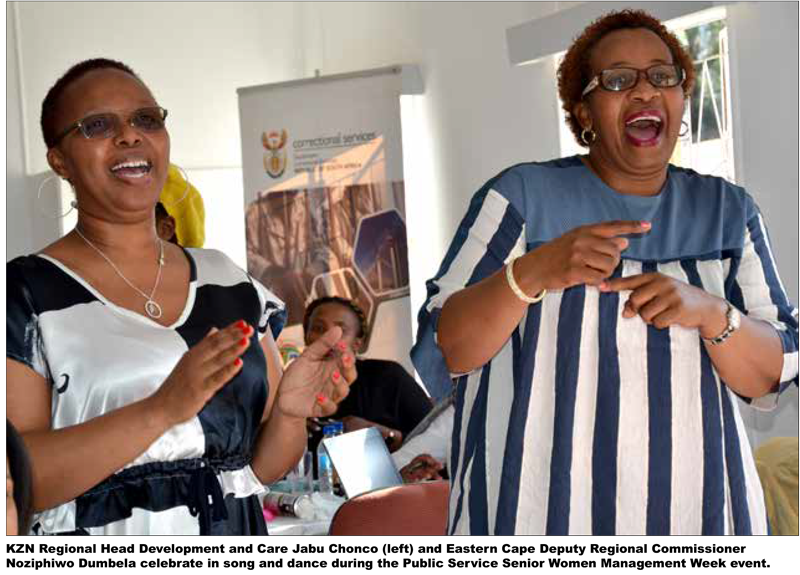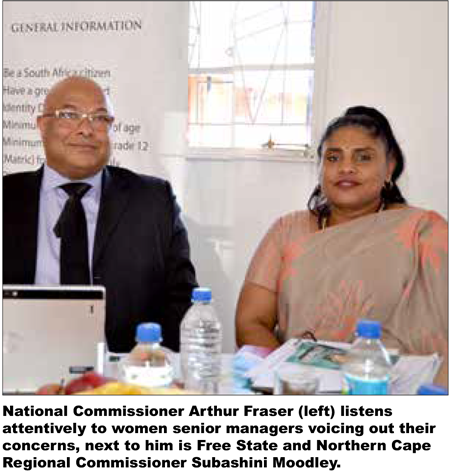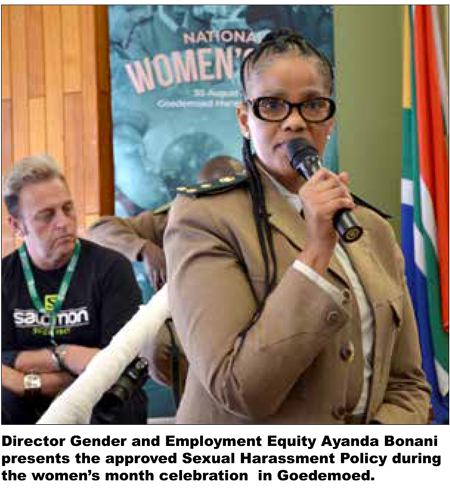 DCS continues to make strides towards creating an enabling environment for women empowerment in the public sector. The emphasis on this year’s Public Service Senior Women Management Week was on principle six and eight of the 8-Principle Action Plan for Promoting Women’s Empowerment and Gender Equality. The two principles speak to capacity development for women’s advancement as well as solidifying the monitoring and evaluation processes to ensure full responsibility, ownership for and reporting on advancing gender equality within the public service. National Commissioner Arthur Fraser had robust solution-driven discussion with Women Senior Managers on 29 August 2019 in Goedemoed Management Area, Free State and Northern Cape region.
DCS continues to make strides towards creating an enabling environment for women empowerment in the public sector. The emphasis on this year’s Public Service Senior Women Management Week was on principle six and eight of the 8-Principle Action Plan for Promoting Women’s Empowerment and Gender Equality. The two principles speak to capacity development for women’s advancement as well as solidifying the monitoring and evaluation processes to ensure full responsibility, ownership for and reporting on advancing gender equality within the public service. National Commissioner Arthur Fraser had robust solution-driven discussion with Women Senior Managers on 29 August 2019 in Goedemoed Management Area, Free State and Northern Cape region.
The Public Service Women Management Week is a platform for the HODs of all government departments to meet with women senior managers and assess progress made in implementing the 8-Principle Action Plan for Promoting Women’s Empowerment and Gender Equality. The department is gradually making progress in employment equity and gender equality but more is required. As it stands today DCS has women occupying just above 43% of senior positions, falling short of the legislative requirement of 50/50 gender parity at decision-making level.

“Achieving gender balance and inclusiveness is an ongoing challenge that DCS will have to conquer within the prescribed timelines. Real empowerment can’t be just about the 50/50 gender parity, it has to be about women being at the centre of operational activities in our organisation, being decision makers and leading in the strategic direction setting. It is a collective responsibility for every men and women to fight for the emancipation and restoration of women dignity,” said Commissioner Fraser. According to Director Gender and Employment Equity Ayanda Bonani, the 50/50 gender parity target was supposed to have been achieved in 2014 and DCS could only reach 39% at the time. She further explained that the cabinet has extended the period to December 2019.
Women gaining more employment opportunities in an industry that has always been male dominated means that they should be prioritised, capacitated and properly trained to prepare them for the unique work environment at correctional centres. Senior managers agreed that women are more than capable of occupying crucial roles in correctional centres when empowered with the right security tools and knowledge. Many expressed dissatisfaction with the type of training provided to learners and saw it as inadequate. Back to basics was one of the solutions put forward that could help reduce the disturbing attacks of females by offenders in correctional centres. 
An overview of reported sexual harassment cases in the workplace and violations by offenders against female officials was presented. Ms Bonani stated that since 2014, about 65 violations have been reported nationally. Attacks of female officials by offenders include hostage situations, assaults, stabbing and rape. The presentations by regions included interventions that were done to curb incidents of this nature and remedial actions to care for the violated. From 2017 to 2019, Human Resource Development has trained female officials on the use of security equipment, gang management training, self-defence, crowd management training, handling of keys, use of force, access control and security management.
This year, the invite for the women’s month commemoration was extended to male senior managers and women in lower positions to encourage inclusive discussions towards women emancipation.
